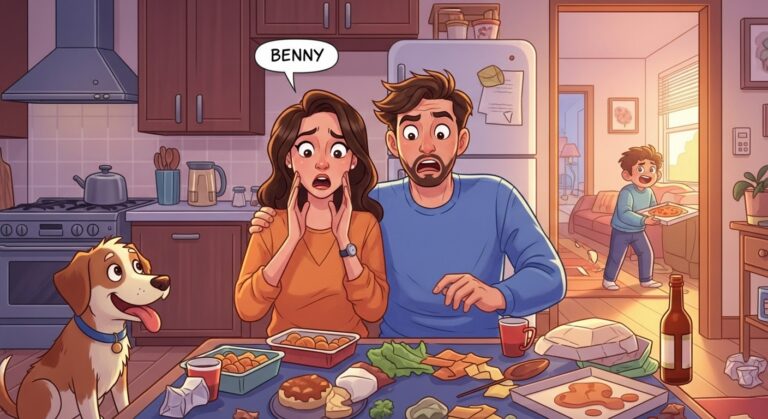In the heart of a bustling European city, nestled between vibrant cafés and cobblestone streets, lived a couple named Mia and Tom. They had made a home for themselves in this foreign land, immersing in the culture and savoring the local cuisine. Their cozy apartment was their sanctuary, a blend of shared dreams and aspirations.
Earlier that year, an acquaintance from their college days, whom we’ll call Kieran, reached out with a desperate plea. He had fallen victim to a rental scam that left him stranded in the city with nowhere to stay. Though they barely knew him well, Mia and Tom, moved by empathy, opened their home for a weekend—a small gesture that would soon spiral into something far more complicated.
Kieran arrived with a suitcase that seemed to hold more stories than belongings. Initially, he was charming, regaling them with tales of his travels and the misfortunes that led him to their door. He helped around the house, washing dishes and tidying up, giving the impression that he was grateful for their hospitality. Yet, as the days turned into weeks, his true colors began to emerge.
It started with small things. The grocery bill, which Mia and Tom typically managed quite well, began to rise dramatically. Kieran never brought any food of his own and often “forgot” his wallet when it came time to contribute. “Oh, I can only use Apple Pay,” he would say, a slight frown on his face as if the world conspired against him. Mia and Tom exchanged glances, a silent acknowledgment of their growing discomfort.
Despite the mounting grievances, they tried to dismiss their unease. After all, Kieran had no place to go. But as the days rolled on, it became evident that Kieran’s generosity was a facade. One evening, Mia and Tom decided to share a pizza for dinner, a simple meal after a long day. They savored each bite, but to their dismay, Kieran polished off not just his share but theirs as well. The empty pizza box was a stark reminder of how their kindness was being exploited.
Frustration simmered beneath the surface, but Mia and Tom remained polite, placing the blame on their own reluctance to confront their guest. They justified his actions with thoughts of kindness and compassion. Yet, with each passing day, their tolerance waned.
When summer arrived, Mia and Tom planned a 17-day trip to explore the enchanting landscapes of the countryside. Knowing Kieran’s financial struggles, they extended another olive branch, inviting him to stay at their apartment while they were away, under the pretense that he would care for their beloved dog, Benny. They crafted a detailed Google Doc outlining Benny’s schedule, complete with feeding times and walks, but deep down, a nagging doubt lingered in Mia’s mind.
As they packed for their trip, they couldn’t shake the feeling that they were making a mistake. “What if he takes advantage of us again?” Mia voiced her concerns, but Tom reassured her. “We’ll be fine. We just need to set boundaries,” he said, optimism lacing his words.
The day of their departure arrived, and with it, a mix of excitement and apprehension. They waved goodbye to Kieran, who promised to take good care of Benny, and set off on their adventure. Days passed, and Mia and Tom reveled in the beauty of their surroundings, letting go of the nagging worries about their friend back home.
As their trip neared its end, a sense of unease crept back in. They called Kieran to check in, but he seemed distant, vague about Benny’s well-being. “Oh, he’s fine,” Kieran said, brushing off their concerns. “I’ve been busy.”
Returning home, Mia and Tom were greeted with an unsettling sight. The apartment was a mess—dishes piled high, trash overflowing, and the air thick with an unpleasant odor. But it was the kitchen that truly shocked them. Their once-stocked pantry was nearly bare. “What happened?” Tom exclaimed, surveying the empty shelves.
Kieran ambled into the room, a sheepish grin on his face. “Oh, I might have eaten a lot of your food. I thought you wouldn’t mind,” he said, shrugging as if it were a minor infraction. Mia felt her heart race, anger bubbling to the surface. “You thought wrong,” she shot back. “You didn’t even buy groceries while we were gone!”
Kieran’s demeanor shifted, and for the first time, he appeared genuinely remorseful. “I didn’t think it would be a big deal. You’re always so generous,” he muttered, avoiding their gaze. A wave of frustration washed over Mia. She realized that kindness without boundaries only led to resentment.
After a long and tense conversation, Mia and Tom decided it was time to take a stand. They compassionately but firmly told Kieran that they could no longer host him. They explained that while they appreciated his company, his actions had crossed a line that could not be ignored. Kieran left that evening, his expression a mixture of disbelief and regret.
In the weeks that followed, Mia and Tom found a renewed sense of peace in their home. They put in place clear boundaries, reminding themselves that kindness doesn’t mean allowing others to take advantage of their generosity. They learned that sometimes, the hardest decisions lead to the most profound growth.
Reflecting on their experience, Mia and Tom realized that not every act of kindness is a burden. With the lessons learned, they decided to channel their energies into community service, helping those truly in need, while ensuring they protected their space and hearts. After all, true generosity is about balance—offering support while maintaining one’s own well-being.
—





0 Comments